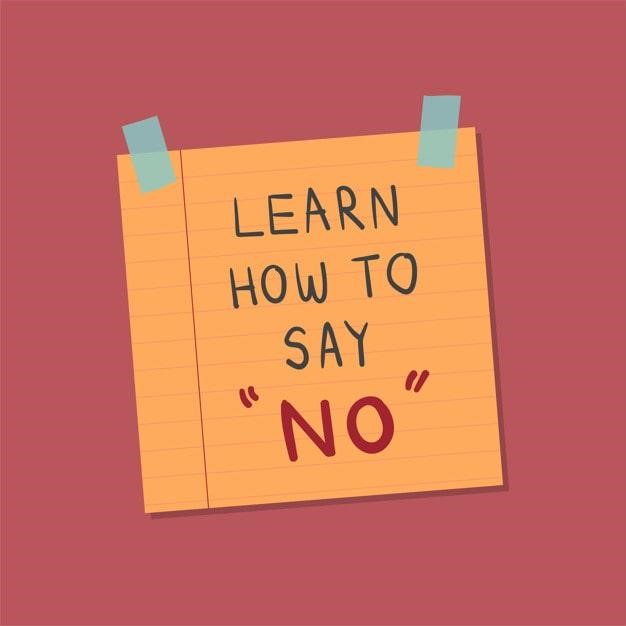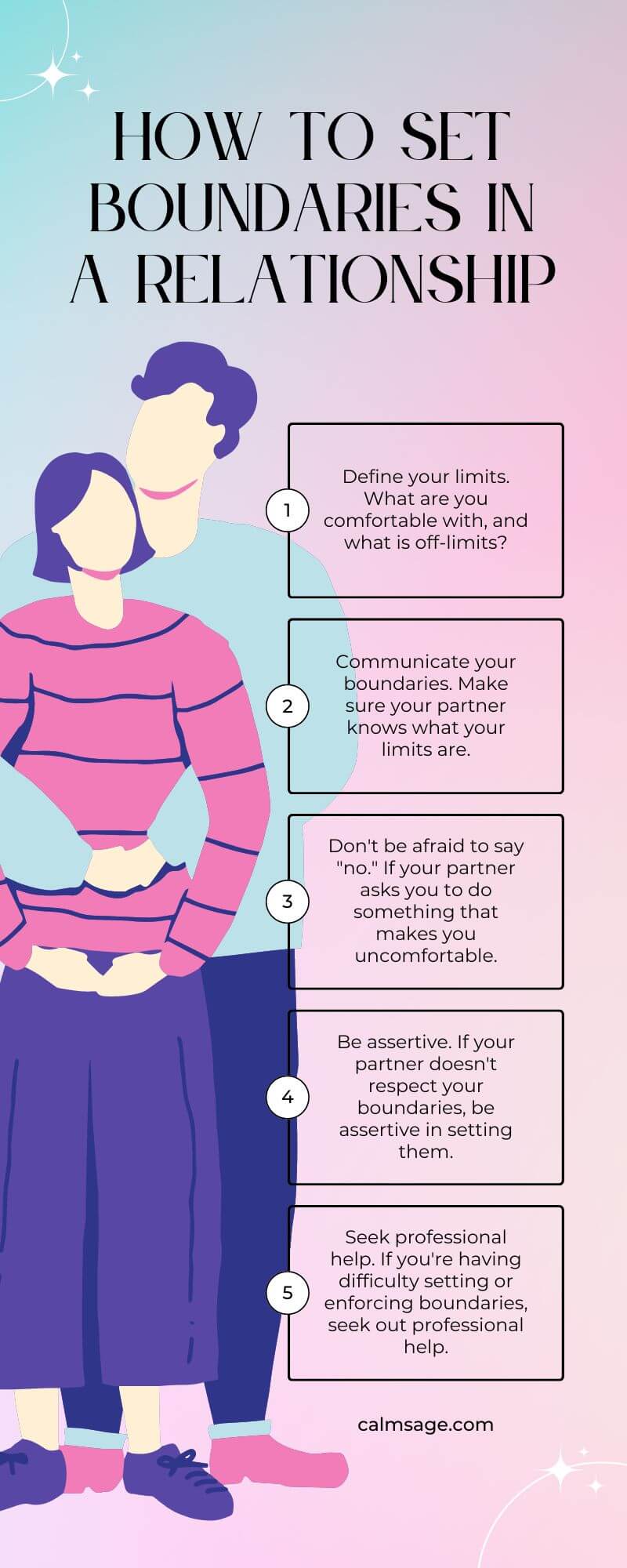How to Set Boundaries in a New Relationship

Boundaries are important in relationships – whether it be a new relationship, marriage, or even friendships. To have a healthy and happy relationship, setting boundaries is essential especially if you’re in a new relationship or are considering the idea of one. Romance, in the early stages of dating, can be exciting but to keep the relationship failing it is important to clearly define boundaries.
The initial stage of dating is the best time to start setting boundaries. To ensure a comfortable and healthy relationship, you need to learn to effectively communicate what your limits are and what is acceptable, and what’s not.
Don’t forget, communication is important. Being honest from the beginning will ensure that your relationship is strong and dependable.
What do boundaries mean in a relationship?

The limits that we set to avoid others distracting or inappropriately engaging with us is what defines boundaries. Respecting boundaries – professional and personal – is important. While some people may look at setting boundaries as unfair and unjust when it comes to personal relationships but setting boundaries allows each person in the relationship to maintain their space and needs as well as mental and emotional health.
Boundaries are of many types. They range from personal and emotional to mental. When you plan a ‘date-night’ with your partner, just the two of you, without your phones or any other distractions is an example of a healthy boundary. In the dating stage, setting healthy boundaries allows each person to have some personal time to get to know each other.
If you’re unable to set boundaries in a relationship, it can cause you to stress and can make taking care of your personal needs complicated. It can make you feel either ignored, abandoned, or smothered in a relationship.
Healthy boundaries in a dating relationship allow people to care for one another’s needs as well as themselves while at the same time respecting the other person.
Emotional boundaries are as important as physical boundaries. When you spend time with someone new, take some time to spend apart from each other as well. None of you should dedicate all of your time to each other.
This is not an example of healthy boundaries. If you fail to set healthy emotional boundaries, it can eventually, in the future, lead to emotional manipulation or abuse.
Examples of Healthy Boundaries in a Relationship
Now that you know what boundaries mean in a relationship, here are some examples of healthy boundaries in a relationship that you can set;
- Resolving conflicts and communicating non-argumentatively during disagreements
- Letting go of codependency and taking time and space to create and stand apart as an individual
- Asking for personal space when you think you need it
- Airing your concerns rather than holding onto them and letting them pull into resentment and anger
- Walking away from a situation where your partner is being disrespectful or abusive towards you
- Allowing yourself to take ownership of your assets – financial or otherwise
- Being true to yourself including your sense of identity, spirituality, and interests
- Allowing yourself to carve out personal time for self-love and self-care
- Having the right to change your mind or not allowing yourself to blindly follow your partner’s ambitions
These are just a few examples of healthy boundaries in a relationship. Let’s see how you can set boundaries in new relationships.
Setting Boundaries In Romantic Relationships
1. Focus On Your Feelings
When we begin seeing someone new, we forget to take time apart, sometimes. It is normal to communicate with each other when not together but communicating all the time isn’t. Take some time apart from each other and focus on when you’re going out or how many times should you talk to each other daily.
The problem comes when we become so entangled with the other’s feelings that we forget about ours. Taking some time to reflect and check-in with yourself can help you differentiate between your and the other person’s feelings.
2. Communication Is A Must
The most important part of any healthy relationship is communication. When needed, use “I” statements to tell your partner what you think is appropriate and what’s not. If your partner is verbally offensive and rude then are crossing a line that you can’t accept – let them know that in a non-threatening and respectful way.
A breach in the boundaries that you’ve set isn’t acceptable and it should be known to your partner. If you’re in a relationship where your partner is repeatedly breaking the boundaries you’ve set, then you should rethink your relationship.
3. Carve Out Some “Me Time”

Being in a novel relationship is exciting but most people don’t realize that spending all their time with their partner isn’t healthy. Sometimes, spending time with your partner can foster feelings like anger and frustration, and before you know boundaries can be broken.
Spending some time with yourself is as important as spending time with your partner. “Me Time” is the best way to understand what you’re feeling and what is needed. When you feel like boundaries are crossed, take some time to regroup. Communicating with your partner when you’re calm will yield better results.
Angry words can’t be taken back, remember that. So before you say something that you’ll regret, take some “me time” to calm down.
4. Learn When To Say “NO”

When you’re dating, all you want is to please your partner and in doing this many people forget to tell their partner “no”. This desire to please can be intense and can make you uncomfortable. All relationships are based on the ‘give and take’ concept and you need to learn when it’s time to give and when to take. Sometimes, saying “no” to your partner is the best thing.
Saying “no” when you need to not only establish a boundary but it also allows your partner to respect your choices. Tell them when you’re uncomfortable, be honest with them, and don’t do anything just to please them.

What if Your Partner is Against Setting Boundaries?
Not every partner would want to keep and respect the boundaries you want to set in the relationship. It could happen when your relationship is new or it could happen in a relationship that is decades old too. So, it’s not your fault for failing to express your boundaries or setting them successfully.
If your partner is against the boundaries in a relationship, then here are some things you can do;
1. Talk to them:
The ideal time to start the boundary talk is when the new relationship is at its beginning stage. That’s when you begin to create routines and habits, so take some time to talk to your partner about your expectations and boundaries. Let them know why you are creating boundaries. Explain the need for the boundaries to your partner properly and clearly.
2. Try to use “I” statements:
Don’t make the conversation sound like you’re going against your partner or their habits. Using “I” statements will help you here to make a personal connection. Start the conversation with, “I feel…” instead of “You do…” or “You make me…”. “I” statements sound less accusatory so lead with them. It’ll also help your partner open up better and maybe explain why they are against boundaries.
3. Ask for space:
If you feel that your partner is crossing boundaries or disrespecting your limits, then know that it’s OK to ask for space. A distance, to your partner, might look like rejection, so make it clear that it’s not the case and that you’re only for some distance to understand your mind and feelings before they have a chance to affect the new relationship, irrevocably.
Get Professional Advice…
Respect, trust, and care are the three most important pillars, in my understanding, that are the foundation of any relationship. If your partner fails to respect, trust, and care for you, they are not the right person for you.
If you need additional support and assistance in learning what you can do to set healthy boundaries, you can seek help from a relationship counselor. You can also write to us or drop us a message at info@calmsage.com for more information.
There might come a time when you may need additional support and guidance from a professional to help you learn how to set boundaries, especially when it’s a new and budding relationship, and where the waters are uncharted.
To reach out to a professional relationship or couples counselor, you can connect with any of the platforms mentioned below. All of them offer couples counseling and relationship advice that you may find helpful.
Don’t hesitate to go for professional counseling when you need professional advice and guidance.
Final Thoughts…
Boundaries are important but they are challenging as well, especially in a romantic relationship. Most people, to please their partner, forget that boundaries exist for a reason. Forcing boundaries is also not a healthy way to begin a relationship. Talking to your partner, as they are your equal in the relationship, is the way to go.
Failure to set boundaries can lead to emotional manipulation or abuse in the future. Setting healthy boundaries doesn’t restrict a relationship instead they help the relationship grow and thrive.
In a healthy, happy relationship, a partner loves, cares, and accepts you and your boundaries. If you’re finding that your partner is not respecting your boundaries or you, for that matter then you might be in a toxic relationship.
All boundaries set should be fair and equal and must be acceptable to the people in the relationship. Someone who fails to respect you and your boundaries is not someone you should continue seeing.
Respect, trust, and care are the three most important pillars, in my understanding, that is the foundation of any relationship. If your partner fails to respect, trust, and care for you, they are not the right person for you.
If you need additional support and assistance in learning what you can do to set healthy boundaries, you can seek help from relationship counselor. You can also write to us or drop us a message at info@calmsage.com for more information.
“When someone loves you, the way they talk about you is different. You feel safe and comfortable.” – Jess C. Scott
Take care, and good luck!




















